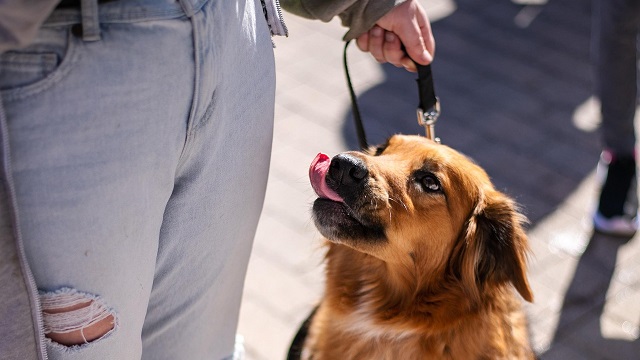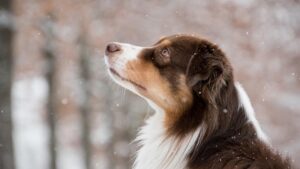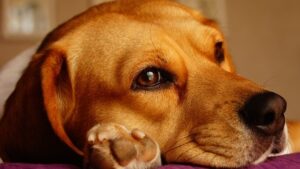Why Is My Dog Licking the Air? Understanding This Curious Behavior
You’ve likely seen your dog do it: that strange, repetitive licking motion, aimed at seemingly nothing at all. They might be sitting calmly, standing in a doorway, or even curled up in their bed, but their tongue is busy going in and out, licking the empty air. This curious behavior leaves any pet parent wondering, “Why is my dog licking the air?” and, more importantly, “Is it a sign of a problem?”
Understanding whether it’s harmless or a sign of a health issue is key to knowing when to simply observe and when to seek professional help.
In this article, we’ll explain why dogs lick the air, how to know when it’s time to contact the vet, and how a pet monitor can be a game changer to ensure your dog’s wellbeing.
Key Takeaways
- Occasional air licking is often a harmless behavior that conveys a dog’s sense of smell or stress relief.
- Constant or obsessive licking can signal a health issue, such as nausea, dental pain, anxiety, or a neurological problem.
- Monitor the behavior and look for other symptoms like lip smacking, lethargy, or changes in appetite.
- A pet health tracker provides essential insights by tracking changes in your dog’s activity, rest, and sleep patterns, which can lead you to find the root cause of their behavior.
- Talk to your vet if the behavior is frequent, new, or accompanied by other concerning signs.
Why Do Dogs Lick the Air?
A dog’s mouth and tongue are incredibly important tools for exploring their world. Air licking, also known as air snapping or fly biting, can be a way for a dog to process smells, relieve stress, but also to signal that something is wrong.
Common Benign Reasons for Air Licking
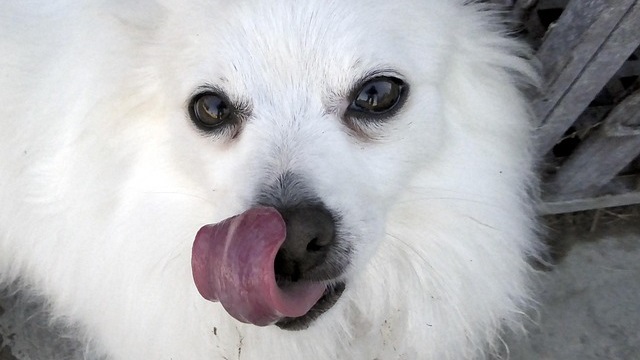
Not all air licking is a cause for concern. Sometimes, this behavior is a normal part of being a dog.
Processing Scents
A dog’s sense of smell is much more acute than a human’s. When they encounter a new or interesting smell, they may lick the air to bring the scent to the Jacobson’s organ, located on the roof of their mouth. This allows them to “taste” the smell and gather more information about their environment.
Anticipation of Food
If you are preparing a meal or opening a bag of treats, your dog might start licking the air in anticipation of getting a taste. This is often accompanied by lip-smacking and is usually a happy, harmless reaction.
Seeking Attention
Some dogs use air licking to get your attention. If you’ve previously responded to the behavior with petting, a treat, or verbal comfort, your dog may repeat it to get a reaction from you.
Why Is My Dog Constantly Licking the Air?
While occasional or brief air licking is often benign, if you find yourself asking, “Why is my dog constantly licking the air?” it’s time to pay closer attention.
When the behavior becomes repetitive, obsessive, or is accompanied by other signs, it can point to a more serious problem.
“I got the Maven sensor for my 14-year-old Chihuahua mix with heart and trachea issues. It gave me back peace of mind – I can track her RRR, BPM, drinking, and activity anytime and know instantly if something’s wrong. Highly recommend!”
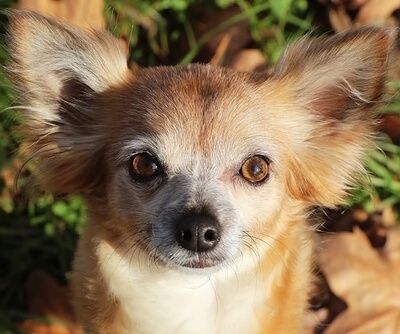
★★★★★
Chiara De Luca
Titti
Medical Causes to Consider
If the behavior is persistent, it’s time to look at some health issues that can be behind air licking.
Nausea or Gastrointestinal Issues
A feeling of nausea can make your dog lick the air, swallow repeatedly, or drool. This can be a sign of an upset stomach, a gastrointestinal blockage, or even a more serious condition like pancreatitis. Look for other symptoms like vomiting, lethargy, loss of appetite, or lip smacking.
Dental Disease
Pain or discomfort from a toothache, a broken tooth, or gum disease can cause a dog to repeatedly lick at their mouth or the air. Signs include bad breath, pawing at the mouth, or dropping food.
Anxiety
Chronic anxiety can lead to obsessive air licking. This might be a response to separation anxiety, a change in routine, or a chronic fear. These behaviors are often repetitive and difficult to interrupt.
Neurological Disorders
In some cases, repetitive air licking can be a sign of a focal seizure. A focal seizure (also known as a partial seizure) affects only a specific part of the brain and may not involve the full-body convulsions we typically associate with seizures.
Other signs of a focal seizure can include fly-biting behavior, tremors, or a dazed, confused expression.
Dementia
For senior dogs, repetitive behaviors like air licking can be a symptom of cognitive decline.
This is often accompanied by other signs of disorientation, such as getting stuck in corners, staring blankly, or changes in their sleep-wake cycle.
When to Call the Vet
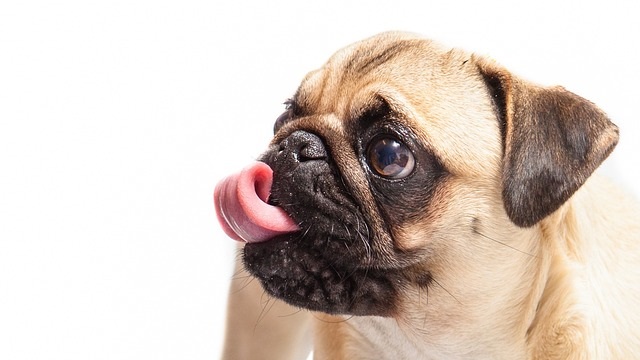
Consult your vet immediately if you notice:
- The behavior is constant and difficult to interrupt.
- Your dog is also pacing, drooling, or seems restless.
- They are showing signs of discomfort or pain.
- The behavior is accompanied by a loss of appetite, lethargy, or other changes.
“While occasional air licking may be harmless, frequent or obsessive behavior often signals discomfort — from dental pain to nausea. Tracking related changes can help us identify the root cause sooner.” — Joana Babo, DVM
How the Maven Pet Health Monitor Helps Track Related Behavioral Changes
Identifying the root cause of your dog’s air licking can be challenging, but a dog health tracker can be the solution you need.
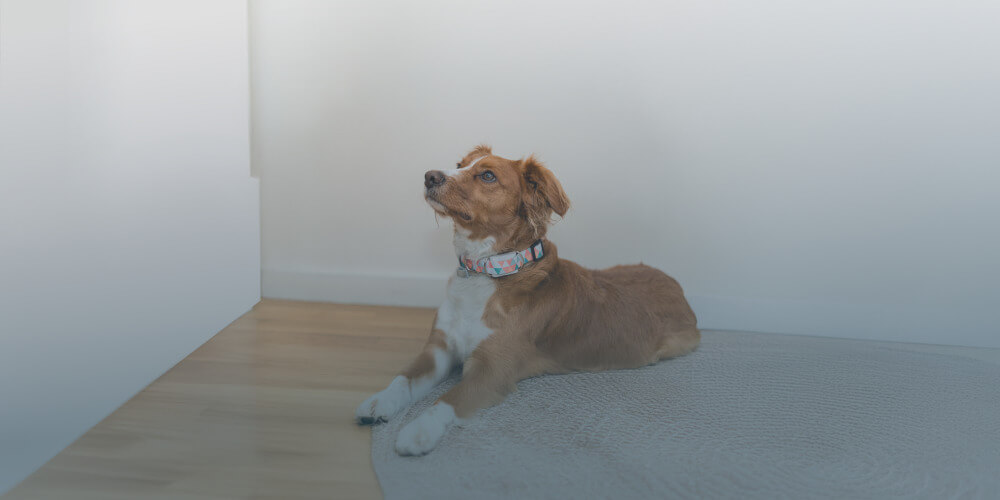
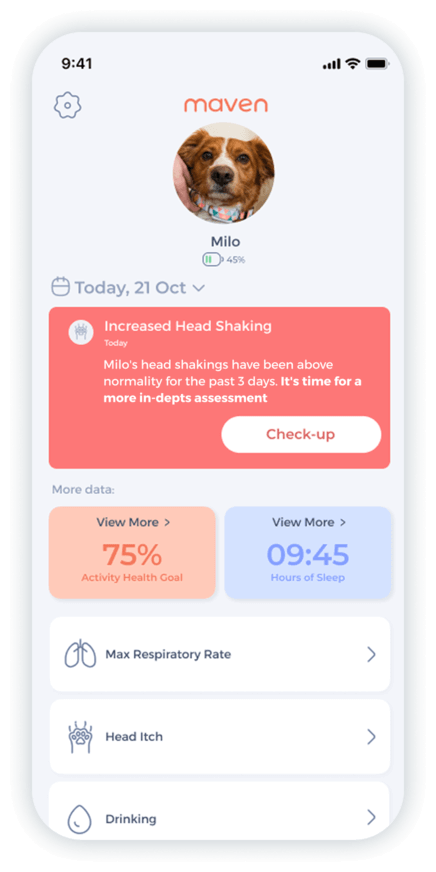
Monitor heart rate, respiratory rate, activity & rest, drinking, itch behavior.
Maven’s pet health monitor goes beyond simple activity counts, it tracks subtle shifts in your dog’s:
- Activity Patterns: Are they more restless than usual? An increase in pacing or agitation can be a sign of anxiety or gastrointestinal discomfort.
- Rest and Sleep: Are they having trouble settling down at night? Changes in nighttime patterns or an inability to rest can be a sign of pain or nausea.
- Nighttime Behavior: Is the licking happening primarily at night? This could point to a sleep-related issue or a form of cognitive dysfunction.
Maven Pet’s monitor gives you and your vet a better picture of what’s happening. This data can help your vet narrow down potential causes, leading to a faster, more accurate diagnosis.
Recap
- Licking the air can be a normal behavior for dogs, but it’s important to pay close attention to their patterns.
- If your dog is licking the air frequently, obsessively, or in combination with other symptoms, it may be a sign of a health problem.
- Monitoring your dog’s behavior, noting any other symptoms, and using a tool like Maven’s pet monitor can provide essential information to your vet.
- This information will help your vet determine the cause of the behavior and ensure your dog is healthy and comfortable.
Maven Pet focuses on improving the quality of life of our pets with technology, using artificial intelligence (AI) to enable proactive pet care. By accurately collecting and monitoring pet data 24/7 and flagging any irregularities, Maven Pet empowers pet parents and veterinarians to stay ahead of potential health issues, ensuring the well-being and longevity of our beloved companions.

